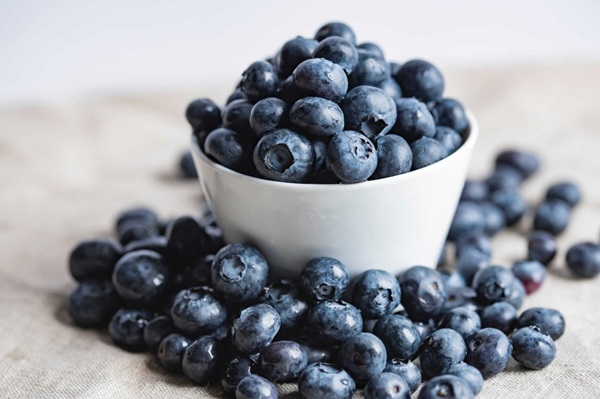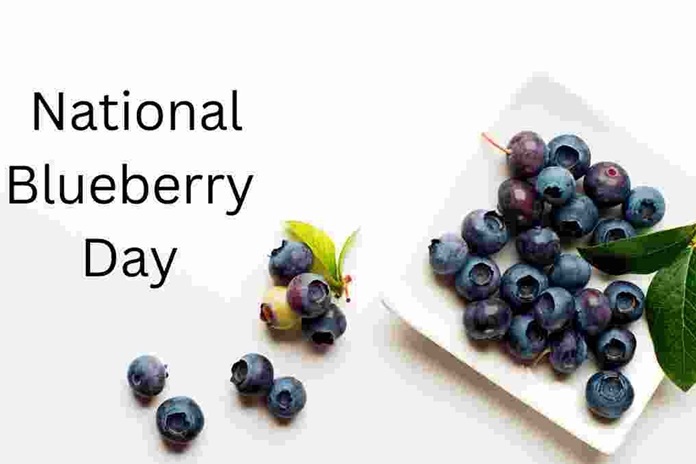National Blueberry Day is celebrated on July 8 every year. We celebrate this day to share information about how blueberries are good for our health. This holiday is about our favorite tasty fruit, which is full of nutrients, fiber, and antioxidants. Blueberries offer many health benefits. They are perfect for a hot to keep us feeling refreshed. The juicy, delicious flavor of blueberries is something we all love.
Know the History of National Blueberry Day
Blueberries are flowering plants that grow yearly and are native to North America. The berries are found in several colors like blue and purple. Modern blueberries are a recent development, first cultivated in the 1900s.
Before that, people used to pick them up from the wild as the wild variety was not possible to feasibly grow and harvest on farms.
We’ve been eating wild blueberries for over 13,000 years. Native Americans knew about the fruit’s versatility and health benefits, using them in medicines and as flavoring in food.
The origin of commercially available blueberries goes back to Elizabeth White and Frederick Coville.

They discovered how to grow blueberries and cultivated them on their farm. Because of their efforts, we can now enjoy the delicious taste and health benefits of blueberries.
As previously mentioned, blueberries provide many health benefits. Numerous studies suggest that eating blueberries daily can improve health by lowering cholesterol levels, promoting heart health, reducing DNA damage, fighting aging and cancer, improving brain function, and combating diabetes.
In North America, blueberries are harvested from April to September. We celebrate Blueberry Day and Blueberry Month during this time.
| 1300 years ago (Native Americans Consume Blueberries) | Native Americans understand the benefits of blueberries and start to consume them. |
| 1911 (First Blueberry Cultivation) | Elizabeth White, along with Frederick Coville, successfully grows blueberries on their farm. |
| 1916 (Commercial Blueberry Crops) | Elizabeth White and Frederick Coville’s team sells their first commercial blueberry crop. |
| 1930 (Blueberry To Europe) | Europeans start to cultivate the highbush blueberry varieties. |
4 Interesting Facts About Blueberries
Largest blueberry producers: The United States and Chile are the largest blueberry producers in the world.
Naturally blue fruit: Blueberries are one of the few naturally blue fruits, this is due to a pigment called anthocyanin.
Heart-healthy food: The American Heart Association has certified blueberries as a heart-healthy food.
U.S. blueberry production: The U.S. produces about 40% of the world’s highbush blueberries.
Nutritional Benefits of Blueberry
Blueberries are not only delicious but also packed with nutrients that contribute to overall health. They are rich in vitamins, minerals, and antioxidants, making them a valuable addition to any diet.
Antioxidants: Blueberries are renowned for their high antioxidant content. They are particularly rich in anthocyanins, the compounds responsible for their deep blue color. Antioxidants help combat oxidative stress and reduce inflammation in the body, potentially lowering the risk of chronic diseases.
Vitamins and Minerals: Blueberries are an excellent source of vitamins C and K, as well as manganese. Vitamin C supports the immune system and skin health, while vitamin K plays a crucial role in blood clotting and bone health. Manganese is essential for metabolic processes and bone development.
Fiber: The dietary fiber in blueberries aids in digestion and helps maintain a healthy gut. Fiber also contributes to feelings of fullness, which can be beneficial for weight management.
Heart Health: Studies suggest that regular consumption of blueberries can have a positive impact on heart health by improving blood pressure and reducing the risk of cardiovascular disease.
Brain Function: There is evidence to suggest that the antioxidants in blueberries may support cognitive function and reduce the risk of age-related decline in brain health.
Conclusion
In conclusion, National Blueberry Day on July 8 is a perfect opportunity to celebrate the remarkable blueberry, a fruit that has been cherished for thousands of years for its flavor and health benefits. From its historical roots with Native Americans to its modern cultivation and widespread popularity, blueberries have come a long way.
They are not only delicious but also packed with essential nutrients, antioxidants, and fiber that contribute to overall health. Their numerous benefits, including improved heart health, cognitive function, and digestive wellness, make them a standout fruit in any diet. As we enjoy the refreshing taste of blueberries, let us also appreciate their rich history and the many ways they support our well-being.
Frequently Asked Question
What are the health benefits of blueberries?
Blueberries offer numerous health benefits, including lowering cholesterol levels, promoting heart health, reducing DNA damage, fighting aging and cancer, improving brain function, and combating diabetes.
Do blueberries help you sleep?
Blueberries aid in reducing sleep deprivation caused by stress. They contain antioxidants that may help reduce stress and create a sense of calm.
How many cups of blueberries should I eat a day?
Eating one cup of blueberries a day can be beneficial for improving cardiovascular health.
When did blueberries first start being cultivated?
Blueberries were first cultivated in the early 1900s by Elizabeth White and Frederick Coville. However, wild blueberries have been consumed by Native Americans for over 13,000 years.
How do antioxidants in blueberries benefit health?
Antioxidants in blueberries help combat oxidative stress, reduce inflammation, and may lower the risk of chronic diseases. They are especially noted for their potential impact on heart health and cognitive function.
You may also like to read, World Chocolate Day – July 7, 2024
